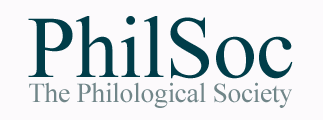This talk will be given at the University of Oxford, in Ertegun House.
PhilSoc Meetings
PhilSoc usually holds seven meetings each academic year, in October, November, January, February, March, May and June (AGM). At most meetings, a full paper is read; other meetings take the format of a thematic symposium. Significant announcements made at meetings are reported on the homepage of the Society's website.
Unless otherwise indicated, tea is served at 3.45pm and the meeting begins at 4.15pm.
The Society has a YouTube channel where video recordings of some of its past meetings may be found.
PhilSoc welcomes proposals for papers to be read at meetings. Proposals should be forwarded to the Honorary Secretary (contact details on the Contact page). Papers may be on any topic falling within the scope of PhilSoc's interests, but speakers are asked to bear in mind that the audience will represent a wide range of linguistic interests, and papers should therefore be accessible to non-specialists.

